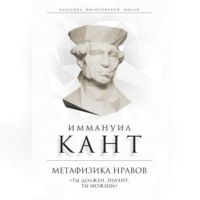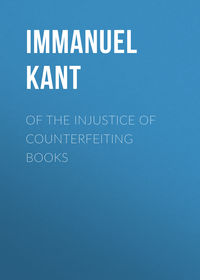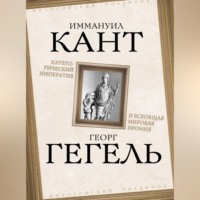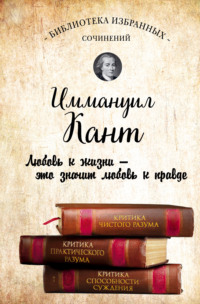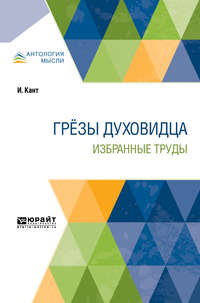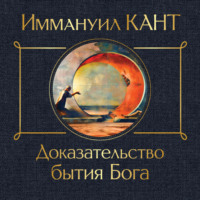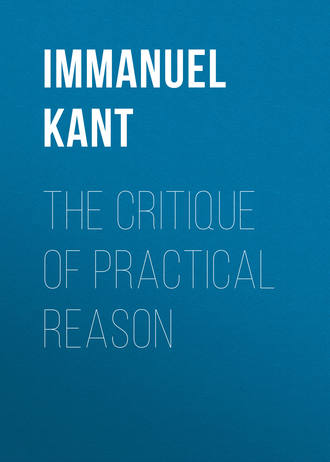 полная версия
полная версияThe Critique of Practical Reason
The difficulty is as follows: Even if it is admitted that the supersensible subject can be free with respect to a given action, although, as a subject also belonging to the world of sense, he is under mechanical conditions with respect to the same action, still, as soon as we allow that God as universal first cause is also the cause of the existence of substance (a proposition which can never be given up without at the same time giving up the notion of God as the Being of all beings, and therewith giving up his all sufficiency, on which everything in theology depends), it seems as if we must admit that a man's actions have their determining principle in something which is wholly out of his power- namely, in the causality of a Supreme Being distinct from himself and on whom his own existence and the whole determination of his causality are absolutely dependent. In point of fact, if a man's actions as belonging to his modifications in time were not merely modifications of him as appearance, but as a thing in itself, freedom could not be saved. Man would be a marionette or an automaton, like Vaucanson's, prepared and wound up by the Supreme Artist. Self-consciousness would indeed make him a thinking automaton; but the consciousness of his own spontaneity would be mere delusion if this were mistaken for freedom, and it would deserve this name only in a comparative sense, since, although the proximate determining causes of its motion and a long series of their determining causes are internal, yet the last and highest is found in a foreign hand. Therefore I do not see how those who still insist on regarding time and space as attributes belonging to the existence of things in themselves, can avoid admitting the fatality of actions; or if (like the otherwise acute Mendelssohn) they allow them to be conditions necessarily belonging to the existence of finite and derived beings, but not to that of the infinite Supreme Being, I do not see on what ground they can justify such a distinction, or, indeed, how they can avoid the contradiction that meets them, when they hold that existence in time is an attribute necessarily belonging to finite things in themselves, whereas God is the cause of this existence, but cannot be the cause of time (or space) itself (since this must be presupposed as a necessary a priori condition of the existence of things); and consequently as regards the existence of these things. His causality must be subject to conditions and even to the condition of time; and this would inevitably bring in everything contradictory to the notions of His infinity and independence. On the other hand, it is quite easy for us to draw the distinction between the attribute of the divine existence of being independent on all time-conditions, and that of a being of the world of sense, the distinction being that between the existence of a being in itself and that of a thing in appearance. Hence, if this ideality of time and space is not adopted, nothing remains but Spinozism, in which space and time are essential attributes of the Supreme Being Himself, and the things dependent on Him (ourselves, therefore, included) are not substances, but merely accidents inhering in Him; since, if these things as His effects exist in time only, this being the condition of their existence in themselves, then the actions of these beings must be simply His actions which He performs in some place and time. Thus, Spinozism, in spite of the absurdity of its fundamental idea, argues more consistently than the creation theory can, when beings assumed to be substances, and beings in themselves existing in time, are regarded as effects of a Supreme Cause, and yet as not [belonging] to Him and His action, but as separate substances.
{BOOK_1|CHAPTER_3 ^paragraph 50}
The above-mentioned difficulty is resolved briefly and clearly as follows: If existence in time is a mere sensible mode of representation belonging to thinking beings in the world and consequently does not apply to them as things in themselves, then the creation of these beings is a creation of things in themselves, since the notion of creation does not belong to the sensible form of representation of existence or to causality, but can only be referred to noumena. Consequently, when I say of beings in the world of sense that they are created, I so far regard them as noumena. As it would be a contradiction, therefore, to say that God is a creator of appearances, so also it is a contradiction to say that as creator He is the cause of actions in the world of sense, and therefore as appearances, although He is the cause of the existence of the acting beings (which are noumena). If now it is possible to affirm freedom in spite of the natural mechanism of actions as appearances (by regarding existence in time as something that belongs only to appearances, not to things in themselves), then the circumstance that the acting beings are creatures cannot make the slightest difference, since creation concerns their supersensible and not their sensible existence, and, therefore, cannot be regarded as the determining principle of the appearances. It would be quite different if the beings in the world as things in themselves existed in time, since in that case the creator of substance would be at the same time the author of the whole mechanism of this substance.
Of so great importance is the separation of time (as well as space) from the existence of things in themselves which was effected in the Critique of the Pure Speculative Reason.
It may be said that the solution here proposed involves great difficulty in itself and is scarcely susceptible of a lucid exposition. But is any other solution that has been attempted, or that may be attempted, easier and more intelligible? Rather might we say that the dogmatic teachers of metaphysics have shown more shrewdness than candour in keeping this difficult point out of sight as much as possible, in the hope that if they said nothing about it, probably no one would think of it. If science is to be advanced, all difficulties must be laid open, and we must even search for those that are hidden, for every difficulty calls forth a remedy, which cannot be discovered without science gaining either in extent or in exactness; and thus even obstacles become means of increasing the thoroughness of science. On the other hand, if the difficulties are intentionally concealed, or merely removed by palliatives, then sooner or later they burst out into incurable mischiefs, which bring science to ruin in an absolute scepticism.
Since it is, properly speaking, the notion of freedom alone amongst all the ideas of pure speculative reason that so greatly enlarges our knowledge in the sphere of the supersensible, though only of our practical knowledge, I ask myself why it exclusively possesses so great fertility, whereas the others only designate the vacant space for possible beings of the pure understanding, but are unable by any means to define the concept of them. I presently find that as I cannot think anything without a category, I must first look for a category for the rational idea of freedom with which I am now concerned; and this is the category of causality; and although freedom, a concept of the reason, being a transcendent concept, cannot have any intuition corresponding to it, yet the concept of the understanding- for the synthesis of which the former demands the unconditioned- (namely, the concept of causality) must have a sensible intuition given, by which first its objective reality is assured. Now, the categories are all divided into two classes- the mathematical, which concern the unity of synthesis in the conception of objects, and the dynamical, which refer to the unity of synthesis in the conception of the existence of objects. The former (those of magnitude and quality) always contain a synthesis of the homogeneous, and it is not possible to find in this the unconditioned antecedent to what is given in sensible intuition as conditioned in space and time, as this would itself have to belong to space and time, and therefore be again still conditioned. Whence it resulted in the Dialectic of Pure Theoretic Reason that the opposite methods of attaining the unconditioned and the totality of the conditions were both wrong. The categories of the second class (those of causality and of the necessity of a thing) did not require this homogeneity (of the conditioned and the condition in synthesis), since here what we have to explain is not how the intuition is compounded from a manifold in it, but only how the existence of the conditioned object corresponding to it is added to the existence of the condition (added, namely, in the understanding as connected therewith); and in that case it was allowable to suppose in the supersensible world the unconditioned antecedent to the altogether conditioned in the world of sense (both as regards the causal connection and the contingent existence of things themselves), although this unconditioned remained indeterminate, and to make the synthesis transcendent. Hence, it was found in the Dialectic of the Pure Speculative Reason that the two apparently opposite methods of obtaining for the conditioned the unconditioned were not really contradictory, e.g., in the synthesis of causality to conceive for the conditioned in the series of causes and effects of the sensible world, a causality which has no sensible condition, and that the same action which, as belonging to the world of sense, is always sensibly conditioned, that is, mechanically necessary, yet at the same time may be derived from a causality not sensibly conditioned- being the causality of the acting being as belonging to the supersensible world- and may consequently be conceived as free. Now, the only point in question was to change this may be into is; that is, that we should be able to show in an actual case, as it were by a fact, that certain actions imply such a causality (namely, the intellectual, sensibly unconditioned), whether they are actual or only commanded, that is, objectively necessary in a practical sense. We could not hope to find this connexion in actions actually given in experience as events of the sensible world, since causality with freedom must always be sought outside the world of sense in the world of intelligence. But things of sense are the only things offered to our perception and observation. Hence, nothing remained but to find an incontestable objective principle of causality which excludes all sensible conditions: that is, a principle in which reason does not appeal further to something else as a determining ground of its causality, but contains this determining ground itself by means of that principle, and in which therefore it is itself as pure reason practical. Now, this principle had not to be searched for or discovered; it had long been in the reason of all men, and incorporated in their nature, and is the principle of morality. Therefore, that unconditioned causality, with the faculty of it, namely, freedom, is no longer merely indefinitely and problematically thought (this speculative reason could prove to be feasible), but is even as regards the law of its causality definitely and assertorially known; and with it the fact that a being (I myself), belonging to the world of sense, belongs also to the supersensible world, this is also positively known, and thus the reality of the supersensible world is established and in practical respects definitely given, and this definiteness, which for theoretical purposes would be transcendent, is for practical purposes immanent. We could not, however, make a similar step as regards the second dynamical idea, namely, that of a necessary being. We could not rise to it from the sensible world without the aid of the first dynamical idea. For if we attempted to do so, we should have ventured to leave at a bound all that is given to us, and to leap to that of which nothing is given us that can help us to effect the connection of such a supersensible being with the world of sense (since the necessary being would have to be known as given outside ourselves). On the other hand, it is now obvious that this connection is quite possible in relation to our own subject, inasmuch as I know myself to be on the one side as an intelligible [supersensible] being determined by the moral law (by means of freedom), and on the other side as acting in the world of sense. It is the concept of freedom alone that enables us to find the unconditioned and intelligible for the conditioned and sensible without going out of ourselves. For it is our own reason that by means of the supreme and unconditional practical law knows that itself and the being that is conscious of this law (our own person) belong to the pure world of understanding, and moreover defines the manner in which, as such, it can be active. In this way it can be understood why in the whole faculty of reason it is the practical reason only that can help us to pass beyond the world of sense and give us knowledge of a supersensible order and connection, which, however, for this very reason cannot be extended further than is necessary for pure practical purposes.
Let me be permitted on this occasion to make one more remark, namely, that every step that we make with pure reason, even in the practical sphere where no attention is paid to subtle speculation, nevertheless accords with all the material points of the Critique of the Theoretical Reason as closely and directly as if each step had been thought out with deliberate purpose to establish this confirmation. Such a thorough agreement, wholly unsought for and quite obvious (as anyone can convince himself, if he will only carry moral inquiries up to their principles), between the most important proposition of practical reason and the often seemingly too subtle and needless remarks of the Critique of the Speculative Reason, occasions surprise and astonishment, and confirms the maxim already recognized and praised by others, namely, that in every scientific inquiry we should pursue our way steadily with all possible exactness and frankness, without caring for any objections that may be raised from outside its sphere, but, as far as we can, to carry out our inquiry truthfully and completely by itself. Frequent observation has convinced me that, when such researches are concluded, that which in one part of them appeared to me very questionable, considered in relation to other extraneous doctrines, when I left this doubtfulness out of sight for a time and only attended to the business in hand until it was completed, at last was unexpectedly found to agree perfectly with what had been discovered separately without the least regard to those doctrines, and without any partiality or prejudice for them. Authors would save themselves many errors and much labour lost (because spent on a delusion) if they could only resolve to go to work with more frankness.
BOOK_2|CHAPTER_1
BOOK II. Dialectic of Pure Practical Reason
CHAPTER I. Of a Dialectic of Pure Practical Reason Generally
Pure reason always has its dialetic, whether it is considered in its speculative or its practical employment; for it requires the absolute totality of the 'conditions of what is given conditioned, and this can only be found in things in themselves. But as all conceptions of things in themselves must be referred to intuitions, and with us men these can never be other than sensible and hence can never enable us to know objects as things in themselves but only as appearances, and since the unconditioned can never be found in this chain of appearances which consists only of conditioned and conditions; thus from applying this rational idea of the totality of the conditions (in other words of the unconditioned) to appearances, there arises an inevitable illusion, as if these latter were things in themselves (for in the absence of a warning critique they are always regarded as such). This illusion would never be noticed as delusive if it did not betray itself by a conflict of reason with itself, when it applies to appearances its fundamental principle of presupposing the unconditioned to everything conditioned. By this, however, reason is compelled to trace this illusion to its source, and search how it can be removed, and this can only be done by a complete critical examination of the whole pure faculty of reason; so that the antinomy of the pure reason which is manifest in its dialectic is in fact the most beneficial error into which human reason could ever have fallen, since it at last drives us to search for the key to escape from this labyrinth; and when this key is found, it further discovers that which we did not seek but yet had need of, namely, a view into a higher and an immutable order of things, in which we even now are, and in which we are thereby enabled by definite precepts to continue to live according to the highest dictates of reason.
It may be seen in detail in the Critique of Pure Reason how in its speculative employment this natural dialectic is to be solved, and how the error which arises from a very natural illusion may be guarded against. But reason in its practical use is not a whit better off. As pure practical reason, it likewise seeks to find the unconditioned for the practically conditioned (which rests on inclinations and natural wants), and this is not as the determining principle of the will, but even when this is given (in the moral law) it seeks the unconditioned totality of the object of pure practical reason under the name of the summum bonum.
To define this idea practically, i.e., sufficiently for the maxims of our rational conduct, is the business of practical wisdom, and this again as a science is philosophy, in the sense in which the word was understood by the ancients, with whom it meant instruction in the conception in which the summum bonum was to be placed, and the conduct by which it was to be obtained. It would be well to leave this word in its ancient signification as a doctrine of the summum bonum, so far as reason endeavours to make this into a science. For on the one hand the restriction annexed would suit the Greek expression (which signifies the love of wisdom), and yet at the same time would be sufficient to embrace under the name of philosophy the love of science: that is to say, of all speculative rational knowledge, so far as it is serviceable to reason, both for that conception and also for the practical principle determining our conduct, without letting out of sight the main end, on account of which alone it can be called a doctrine of practical wisdom. On the other hand, it would be no harm to deter the self-conceit of one who ventures to claim the title of philosopher by holding before him in the very definition a standard of self-estimation which would very much lower his pretensions. For a teacher of wisdom would mean something more than a scholar who has not come so far as to guide himself, much less to guide others, with certain expectation of attaining so high an end: it would mean a master in the knowledge of wisdom, which implies more than a modest man would claim for himself. Thus philosophy as well as wisdom would always remain an ideal, which objectively is presented complete in reason alone, while subjectively for the person it is only the goal of his unceasing endeavours; and no one would be justified in professing to be in possession of it so as to assume the name of philosopher who could not also show its infallible effects in his own person as an example (in his self-mastery and the unquestioned interest that he takes pre-eminently in the general good), and this the ancients also required as a condition of deserving that honourable title.
{BOOK_2|CHAPTER_1 ^paragraph 5}
We have another preliminary remark to make respecting the dialectic of the pure practical reason, on the point of the definition of the summum bonum (a successful solution of which dialectic would lead us to expect, as in case of that of the theoretical reason, the most beneficial effects, inasmuch as the self-contradictions of pure practical reason honestly stated, and not concealed, force us to undertake a complete critique of this faculty).
The moral law is the sole determining principle of a pure will. But since this is merely formal (viz., as prescribing only the form of the maxim as universally legislative), it abstracts as a determining principle from all matter that is to say, from every object of volition. Hence, though the summum bonum may be the whole object of a pure practical reason, i.e., a pure will, yet it is not on that account to be regarded as its determining principle; and the moral law alone must be regarded as the principle on which that and its realization or promotion are aimed at. This remark is important in so delicate a case as the determination of moral principles, where the slightest misinterpretation perverts men's minds. For it will have been seen from the Analytic that, if we assume any object under the name of a good as a determining principle of the will prior to the moral law and then deduce from it the supreme practical principle, this would always introduce heteronomy and crush out the moral principle.
It is, however, evident that if the notion of the summum bonum includes that of the moral law as its supreme condition, then the summum bonum would not merely be an object, but the notion of it and the conception of its existence as possible by our own practical reason would likewise be the determining principle of the will, since in that case the will is in fact determined by the moral law which is already included in this conception, and by no other object, as the principle of autonomy requires. This order of the conceptions of determination of the will must not be lost sight of, as otherwise we should misunderstand ourselves and think we had fallen into a contradiction, while everything remains in perfect harmony.
BOOK_2|CHAPTER_2CHAPTER II. Of the Dialectic of Pure Reason in defining the
Conception of the "Summum Bonum".
The &in fact one and the same method, inasmuch as they did not allow virtue and happiness to be regarded as two distinct elements of the summum bonum, and consequently sought the unity of the principle by the rule of identity; but they differed as to which of the two was to be taken as the fundamental notion. The Epicurean said: "To be conscious that one's maxims lead to happiness is virtue"; the Stoic said: "To be conscious of one's virtue is happiness." With the former, Prudence was equivalent to morality; with the latter, who chose a higher designation for virtue, morality alone was true wisdom.
While we must admire the men who in such early times tried all imaginable ways of extending the domain of philosophy, we must at the same time lament that their acuteness was unfortunately misapplied in trying to trace out identity between two extremely heterogeneous notions, those of happiness and virtue. But it agrees with the dialectical spirit of their times (and subtle minds are even now sometimes misled in the same way) to get rid of irreconcilable differences in principle by seeking to change them into a mere contest about words, and thus apparently working out the identity of the notion under different names, and this usually occurs in cases where the combination of heterogeneous principles lies so deep or so high, or would require so complete a transformation of the doctrines assumed in the rest of the philosophical system, that men are afraid to penetrate deeply into the real difference and prefer treating it as a difference in questions of form.
{BOOK_2|CHAPTER_2 ^paragraph 5}
While both schools sought to trace out the identity of the practical principles of virtue and happiness, they were not agreed as to the way in which they tried to force this identity, but were separated infinitely from one another, the one placing its principle on the side of sense, the other on that of reason; the one in the consciousness of sensible wants, the other in the independence of practical reason on all sensible grounds of determination. According to the Epicurean, the notion of virtue was already involved in the maxim: "To promote one's own happiness"; according to the Stoics, on the other hand, the feeling of happiness was already contained in the consciousness of virtue. Now whatever is contained in another notion is identical with part of the containing notion, but not with the whole, and moreover two wholes may be specifically distinct, although they consist of the same parts; namely if the parts are united into a whole in totally different ways. The Stoic maintained that the virtue was the whole summum bonum, and happiness only the consciousness of possessing it, as making part of the state of the subject. The Epicurean maintained that happiness was the whole summum bonum, and virtue only the form of the maxim for its pursuit; viz., the rational use of the means for attaining it.



